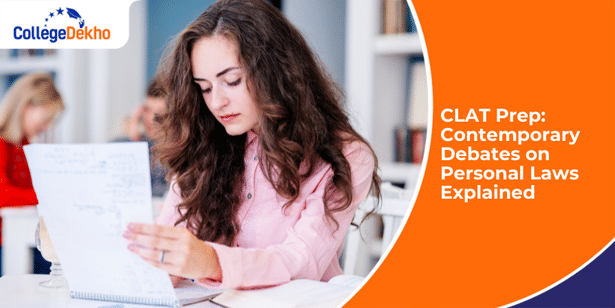
CLAT 2026 Prep:
A profound analysis of personal laws is only possible if you go through the Supreme Court or High Court highlights involving privacy, maintenance, divorce, and custody diligently every month. The recent cases that took place in 2025 focused on UCC developments, privacy of spouses, digital evidence, gender-neutral adoption, maintenance of children by divorced parents, exhibiting how family laws have evolved over all these years. Go through the article below to gain deeper insights into the Contemporary Debates on Personal Laws Explained, primarily concentrating on Supreme Court and High Court rulings. Additonally, to promote gender justice, LGBTQ rights like same-sex marriage has been legally recognized.
Also Read:
A Complete Guide to Preparing for CLAT 2026 in Your Summer Break
Marriage Under Hindu Personal Laws
Hindu Marriage Act, 1955 (HMA) reformed marriage law which applies to Hindus, Buddhists, Sikhs, and Jains. It covers registration and solemnization to ensure validity, legality, and uniformity of Hindu marriages.
- In the Seema vs. Ashwani Kumar case (2006), SC directed mandatory registration for all marriages in order to strengthen marriage law enforcement.
- Under Section 7 comes the Solemnization of Hindu Marriage, where marriage is considered valid only if it is performed according to customary rites & ceremonies of either parties and includes exchange of garlands and Yajna rituals. Marriage is completed after Saptapadi (7 steps around sacred fire).
- As a result, marital rights will be protected, child marriages and polygamy will be prevented, and customs will be recognized.
Under Section 5
- Neither party should have a spouse living at the time of the marriage
- Neither party should be incapable of giving a valid consent to the marriage as a consequence of unsoundness of mind
- Neither party should be suffering from any mental disorder that would make him/ her unfit for marriage or the procreation of children
- At the time of marriage, the bridegroom must have completed the age of 21 years and the bride must have attained the age of 18.
- Neither party should be within the degrees of prohibited relationship (for example, linear ascendant/ descendant relations, brother-sister, uncle-niece, aunt-nephew, marriage with spouse of close relatives), unless custom allows
- Both parties must not be Sapindas of each other, i.e., they must not have common ancestors (up to 3rd generation on Mother’s side and up to 5th generation on Father’s side), unless custom allows.
Under Section 5 (I) & Section 17 of Hindu Marriage Act
- Polygamy and Polyandry are prohibited
- Violation of this condition will lead to the annulment of the marriage under Section 11 HMA.
- The party will be punished under IPC Sec. 494 & 495, Sec. 18 HMA (up to 2 years RI or INR 1 lakh fine or both for marriage within the degrees of prohibited relationship and 1 month SI or INR 1000 fine for Sapinda relationship), and Sec. 82 BNS.
Uniform Civil Code (UCC) Debate
The Uniform Civil Code debate escalated in 2024-25 and protests broke out regarding religious rights with gender and legal equality after a controversial judgement by the Supreme Court inviting opinions in favour of or against the UCC.
- The UCC puts forward that there must be one single unified set of personal laws that all citizens must abide by, to treat all citizens equally, upholding equality before the law and secularism.
- It is in alignment with the principles of equality under Article 14 of the Indian Constitution and non-discrimination under Article 15 and promotes equality and gender justice, regardless of religion.
- Women will be benefited in matters of divorce, inheritance, and custody.
- It also aligns with the Directive Principles of State Policy section of Article 44 of the Indian Constitution that states, "The State shall endeavour to secure for the Citizens a Uniform Civil Code throughout the Territory of India."
- National integration and unity can be obtained by creating a sense of shared identity among citizens and eliminating religious and gender-based discriminatory provisions from personal laws.
- However, it might abrogate the right to religious liberty or freedom of beliefs of minorities like Muslim and Christian communities.
- The UCC challenges Article 25 of the Indian Constitution that guarantees the freedom of conscience, freedom to profess, practice, and propagate religion to all citizens, and Article 29 which provides that any section of citizens with a distinct language, script, or culture has the right to conserve the same.
- After India gained independence, Hindu personal laws were codified by the Indian Parliament in the form of Hindu Code Bills in 1955-56 and the Shah Bano case in 1985 urged SC to adopt the UCC
- The Sarla Mudgal vs. the Union of India case of 1995 increased the need for adoption of uniform principles by drawing attention to the disputes between personal laws in cases of conversion and bigamy.
- Shayara Bano vs. Union of India (2017) strengthened constitutional supremacy in the amendments of personal laws by abolishing instant triple talaq.
Supreme Court Secret Rules that Recording of Conversations of Spouses can be Used in Judicial Proceedings
In Vibhor Garg v. Neha (2025), the Supreme Court announced that secretly recorded conversations of spouses are permissible as evidence in matrimonial disputes or divorce cases since it can be proven if a marriage is troubled or not going strong. However, this judgement opposes Section 122 of the Indian Evidence Act that says “no person who is or has been married, shall be compelled to disclose any communication made to him during marriage by any person to whom he is or has been married”.
Violation of Spouse’s Right to Privacy in Marriage
The Chattisgarh High Court has set forth that if you force a spouse to share his/her digital passwords (phone or bank account), it is a breach of the individual’s right to privacy violating Article 21 of the Indian Constitution. It leads to the protection of privacy in marital relationships.
Shivangi Bansal v. Sahib Bansal, 2025
The Supreme Court has ruled that it can intervene in contentious private affairs and disputes and by making use of Article 142. It can exercise its right to dissolve marriages taking the welfare of the family into consideration and doing complete justice. However, it stands in opposition to the Section 498A of IPC.
Navin Scariah v. Priya Abraham, 2025
It deals with maintenance, custody, and guardianship of children by divorced parents. The Kerala High Court held that the responsibilities of parents will continue lifelong and both must be involved in the progress of their children, irrespective of whether they remain husband and wife or not.
Also Read:
Tips to Prepare for Current Affairs Section of CLAT 2026
For all your CLAT related queries you can post them on our
QnA zone
. Feel free to write to us through our
Common Application Form
or call us on our toll free number 1800-572-9877!

















Similar Articles
NLU Merit List 2026: Check NLU-Wise CLAT Merit List for All Rounds
CLAT 2026 Cutoff for NLU Jodhpur
CLAT Round 2 Cutoff 2026, 2025, 2024, 2023, 2022, 2021, 2020, 2019 - Check Opening and Closing Ranks for General, OBC, SC, ST
CLAT 2026 Cutoff for NLU Hyderabad
CLAT 2026 Cutoff for NLU Bangalore
CLAT Second Selection Merit List 2026: NLU-wise Allotment List PDF, Cutoff